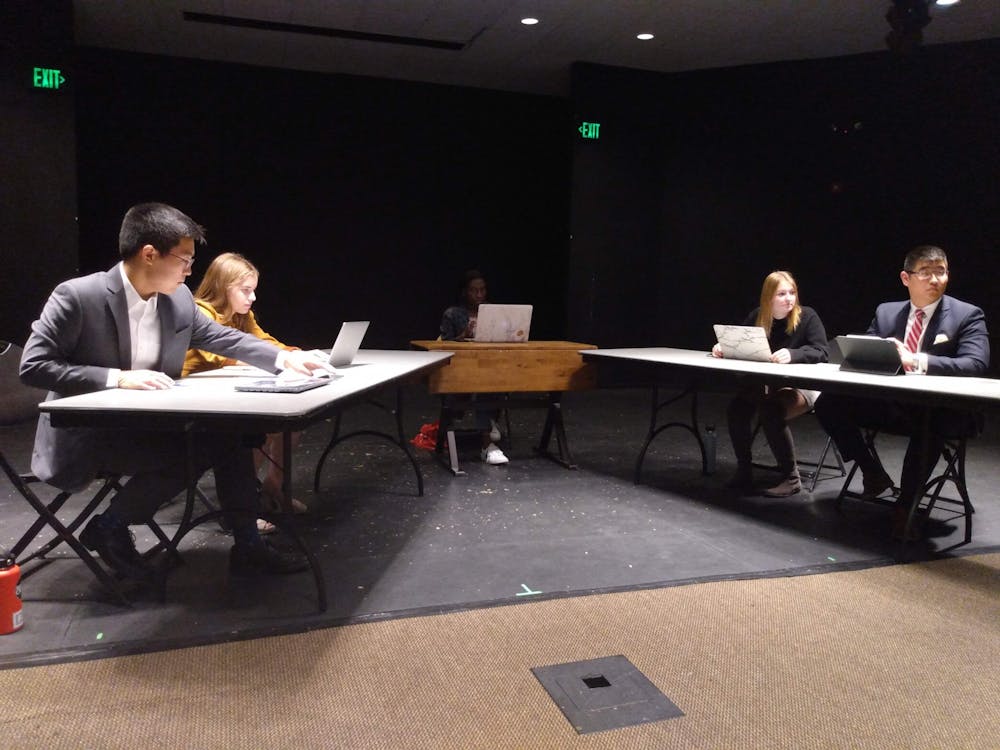The College Democrats at Hopkins and the College Republicans at Hopkins held a debate on Monday. Students from both clubs debated the merits of public health care, America’s involvement in the United Nations (UN) and executive orders.
The event was moderated by Senior Renee Robinson, president of the Political Science Steering Committee, a club dedicated to providing opportunities for political science professors and majors to interact.
Sophomore and Co-President of the College Democrats Sylvana Schaffer, who helped organize the event, told The News-Letter that the goal was to keep students informed about important issues during the lead-up to next year’s presidential election.
“We really want to foster that bipartisan discussion,” she said.
Senior and Vice President of the College Republicans Brad Presson seconded this idea. Presson explained that although the evening’s topics were not necessarily the most controversial issues, they were still crucial.
“They are very serious topics that need more discussion and more education,” he said.
The first debate was centered around health care. Freshmen Greta Maras and Chris Park represented the Democrats, while freshman Samantha Camp and senior William Satterfield represented the Republicans.
The Democrats argued that the current American health-care system should be replaced with socialized health care.
“The markets have failed on health care,” Maras said. “We believe that health care is a right and not a privilege, and regardless of how much you make, you have the right to a healthy life.”
The Republicans countered this by insisting that such a health-care model would be too expensive for the federal government to maintain.
“Medicare for all would be detrimental to our economy, requiring too much of our GDP [or] an increase of our national debt by an alarming amount, all without proper evidence of increased results and improved experiences for patients in the health-care system,” Satterfield said.
Camp agreed that everyone should be able to access health care, but disagreed with their proposed solution.
“Regulations and decisions on how to spend health-care budgets should be a state-level decision, rather than a one-plan-fits-all solution dictated by the federal government,” Camp said.
The second debate was between junior Armstrong Gbessagee on behalf of the Republicans and sophomore Layla Yousef and junior Bonnie Jin on behalf of the Democrats. They discussed American involvement in the UN.
Gbessagee started the discussion, arguing that America should lower its commitments to the UN because it no longer serves U.S. interests.
“The UN has been a sea of increasing anti-U.S. and anti-Israel sentiments, which are contrary to the United States’ global interests and foreign policy interests. It is the paramount prerogative of every nation to prioritize spending their resources and taxpayer money on issues that are primary to them and that progress their interests globally, and the UN is currently not achieving that,” he said.
According to Gbessagee, Russia and China’s veto power makes it too hard for the US to consistently achieve their goals within the UN, and the U.S. pays for almost a quarter of the UN’s budget, far more than any other member state.
“The United States actually is paying more than its fair share when it comes to its contribution to the UN,” Gbessagee said. “All nations around the world have to be paying equally… and not just free-riding.”
Yousef and Jin disagreed with Gbessagee’s stance, arguing that the UN is a useful tool for solving international threats.
Yousef also said that backing out of the UN would make it seem as though America did not care about its humanitarian efforts.
“How will the U.S. be looked upon by its allies when it fails to provide aid to people in need?” she said.
Jin conceded that the UN was not a perfect system for America, but insisted that it was far from the money pit Gbessagee suggested.
“We shouldn’t abandon the UN just because it has failed in certain areas. We should instead look at those issues, criticize them and improve them within the system and not just remove ourselves from the area and allow for a vacuum where leadership can be taken by other nations,” Jin said.
The third and final debate covered executive orders, with sophomores Sylvana Schaffer and Mario Aguirre representing the Democrats and senior Brad Presson and sophomore Alec Snarski representing the Republicans.
Snarski argued that executive orders give the president too much control and upset the balance of power between the federal branches.
“They’re undermining the will of the people, and the Congress that the people democratically elected,” Snarski said. “We believe that people should look to the president as a law enforcer, not a lawmaker.”
Presson expressed a belief that executive orders can lead towards a slippery slope of presidential abuses, but Aguirre said that this fear was unfounded. Aguirre stated that the public could vote in a president that would overturn executive orders if they did not like them.
“We don’t believe that the slippery slope effect occurs, where the president will keep on signing more authoritarian measures,” he said.
After the debate was over, Aguirre told The News-Letter that he thought the event was a success.
“I’d have liked to see more student turnout, but there was a lot of intellectual discussion going on, and I’m glad we as HopDems got to work with the Republicans,” he said.
Freshman Alexa Swift said that she enjoyed attending the event, and that it was great to see students get involved with politics on campus.
“The Democrats especially were really eloquent,“ Swift said. “I loved hearing everyone’s opinions.”
Editor’s Note: News-Letter contributing writers Bonnie Jin, Greta Maras and Chris Park participated in the debate. They were not involved in the reporting or editing of this article.





